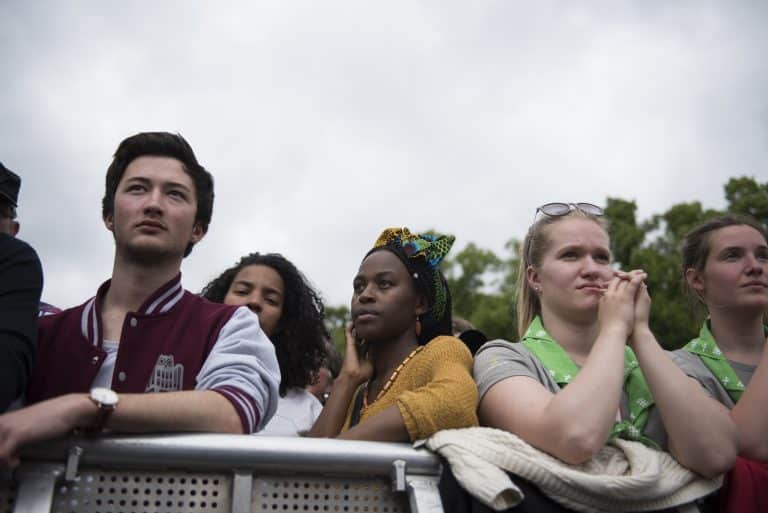
Image by Kevin N. Murphy/Flickr, Some Rights Reserved.
If Community Were A Safe Place To Fall Apart
I recently got together with a dear friend who wanted to share with me the difficult news of his impending divorce. It was a difficult conversation, filled with sadness and even shame on his part.
I had been there for his courtship and wedding. The wedding was a joyous occasion, surrounded by family, friends, and loved ones.
I remember the wedding very fondly… Dancing till late at night. Amazing food. Laughter. Photographs. Beaming bride and groom. Friends had gathered from all over the world to celebrate this union.
I remember their wedding pictures, wedding videos.
A couple in love. Amazing friends who surrounded them.
Friends took turns reading poems and prayers for them.
It was a public celebration of their defiant love for each other.
Over the years, we had checked in with each other periodically. I knew that the marriage had not been going over well. He had confided me a number of times about struggles over things big and small. Once it was about curtains. Another time, a fight over tiles. Most of the time it seemed to be resentments that festered till they blocked out the love that they had once had for each other.
They are beautiful people, both of them. It was not a matter of his fault, or her fault. But you could see them drifting apart in slow motion. It was not a blow-up, not a volcano, but more like the melting of the polar ice caps. They slowly melted away, and every now and then you would see a piece of their love come crashing down.
When I sat down with my friend again recently, they had decided to call it quits. There were no harsh words, no tears, no explosions. Only a drifting away. A disentanglement.
We often think of “divorce” as an event. We talk about people “getting divorced.” The truth of the matter is that divorce is a process. It’s a journey. We think of “falling in love” and courtship as a journey. The truth of the matter is that falling out of love is also a journey.
There is a divorce of intimacy.
There is a divorce of social circles.
There is a sexual divorce.
There is a communication divorce.
There is a divorce of dreams and hopes.
There is a divorce of family rituals.
What we talk about as “getting divorced” is often merely the last stage, the legal one. Before that, there have been many other divorces.
One by one, I saw my friend and his former lover change their Facebook statuses to “single.” And as they say, it’s not real until it’s on Facebook.
My friend and his former wife had gone through these divorces in secret and silence. Their union and wedding had been public. Their divorces took place mostly in the shadows.
And it made me ponder: how is that the coming together is in the light, in public, a public celebration — but the falling apart done in the shadows, in silence, in loneliness?
If we are a community, we should be together through thin and thick, for better and for worse. We stand together in the valleys and on the mountaintops. How do we make it possible for us to stand together when each of us goes through the valleys?
Why do we celebrate together but suffer in silence?
It made me realize that we have no rituals for suffering, for breaking up, for hurting. I am not sure what those rituals would look like, but it does seem like something to seek.
How do we create a sense of community that makes it easier for us to reach out to one another to let each other know that we are struggling in the most intimate parts of our lives? That we can share our vulnerability and hurts more freely with one another?
How do we make it easier to ask for help and support, before things get so bad? When they have gotten so bad? Through the so-bad? And on to the beyond-the-so-bad?
Perhaps we can affirm to one another that they, we, all of us, need not suffer in silence. So many of us have families and relationships that do not look like the idealized images around us. That’s especially true in these holiday seasons, when many people are hurting in silence. The holiday times are often lonely for many. Others have to be around difficult family members out of a sense of obligation. Some of our children have to spend their holidays navigating their way by going back and forth between former partners who no longer can stand to be around each other.
Let us be friends to one another for a lifetime. Let us be friends who are here to love and support each other. And to know that we are here for each other in the joyous celebration, and in the mourning and the grief. Let us form beautiful and intimate circles of love and support for one another, to celebrate and also to grieve together.
This we know: it’s not the end of the world. It’s the end of one world, with many other worlds possible.
Let us mourn the ending of one world together, even as we anticipate the arrival of other, more joyous worlds to come. Let us not suffer in the shadow, alone. Let our grief be as public and shared, loved and supported, as we insist our joys be.
There is healing and redemption in that togetherness.

